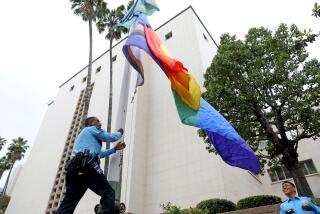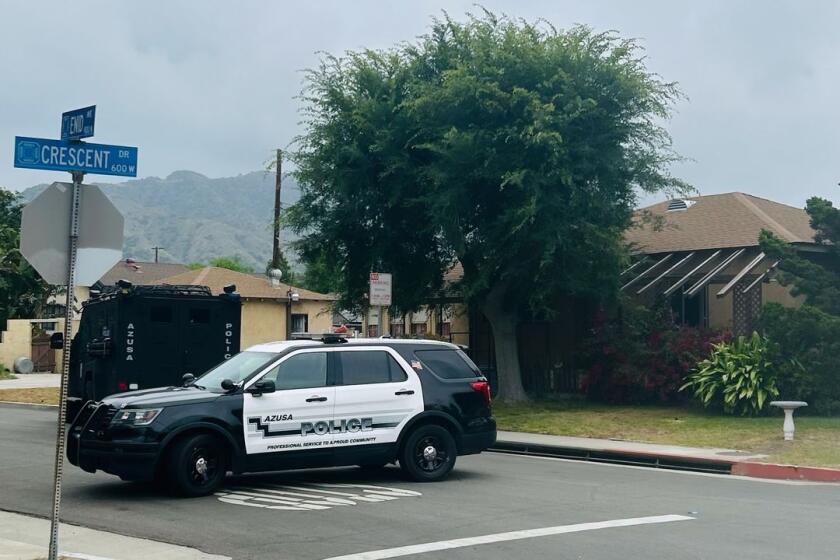After a Night on the Streets, Students Say ‘Never Again’
Colin Epstein, Pitzer College class of ‘89, slept outdoors in cardboard cartons for four nights to prepare for one night in Los Angeles among the homeless, only to shudder later over memories of the real thing.
“Nothing could have prepared us. We’re not as confident as we were when we started,” said Epstein, one of the Claremont Colleges’ most dedicated participants in Homeless Awareness Week. He and about 20 other students slept in their replica of a shantytown on the campus of Pitzer, a small private college in the Claremont group, then spent last Friday night among the homeless on the streets of Los Angeles in order to deepen their learning experience.
“The garbage, the filth on those streets--it’s no wonder so many homeless people are mentally unbalanced,” Epstein said. “If I had to spend more time there, I’d be losing it, too.”
Epstein concluded: “We found the dragon has 17 heads. There’s so much to do.”
“It was a good thing to do, and it was the most horrible thing,” said Cheryl Droge, a sophomore from Santa Ana, of her night among the homeless. “It heightened my awareness, but I’d never do it again.”
Droge said she felt “freaky, sticking out like a sore thumb,” among the homeless people she wanted to befriend. She said she hated feeling the resentment of people “who don’t have any choices about where to sleep or what to eat--who just have to take what they get.”
And still, she said, “I definitely will keep trying to help.”
David Callies, the Pitzer junior who instigated Homeless Awareness Week and helped found Students Organized for America’s Homeless, said “the situation is a lot more hopeless than I thought” before his sleepless Friday night.
That night, Callies and the other students from Claremont were taken on a “guided tour” of the Los Angeles area where the homeless congregate. Their guides were several homeless people who are leaders of a group called Justiceville. Most of the students slept only a few hours early Saturday morning, huddled in sleeping bags in a pedestrian tunnel that connects the civic center with the Music Center.
They ate baloney sandwiches that had been donated to the homeless, even though they said they were reluctant to eat food that was intended for other, hungrier people. They used bathrooms in public buildings and restaurants. They stayed together in small groups, and they listened for hours to those who wanted to talk.
They witnessed drug traffic, drunkenness and the workings of a loosely organized community that the homeless have created to police themselves and protect people such as the visiting students.
“Most of them are people who have just given up,” said Callies, who found that the homeless are of all ages, races and educational levels.
“We went there very ignorant. All we had were words,” said Homer Garcia, the Pitzer professor whose class, introductory social problems, sparked the campuswide interest in homelessness.
The Skid Row experience, Garcia said, “brought about some very much-needed education for students, stuff you can’t get out of a book. It will translate into activism.”
Everything he and the students witnessed, Garcia said, was “so much worse than anything we had anticipated. It was unimaginable.”
Homeless Awareness Week began with pledges of $1 a month to be given to the homeless. It continued with a fast day, when food that was not eaten in campus dining halls was donated to the homeless, and a clothing drive. On Thursday, representatives from Justiceville spoke to about 150 students at a conference at Pitzer College, and on Saturday, after their all-night experience, several students attended a rally for the homeless near Los Angeles City Hall.
The week ended with a party--the admission fee was $1 and two cans of food--attended by an estimated 1,000 students from all the Claremont colleges.
The results have not been tallied, but Garcia gave this accounting so far:
He opened a bank account for Students Organized for America’s Homeless with about $1,000 that came from faculty donations, the $1 monthly pledges and some of the dance proceeds.
About 2,000 cans of food were collected and taken to Justiceville.
Clothing donated for the homeless almost filled a room.
More to Read
Start your day right
Sign up for Essential California for news, features and recommendations from the L.A. Times and beyond in your inbox six days a week.
You may occasionally receive promotional content from the Los Angeles Times.






